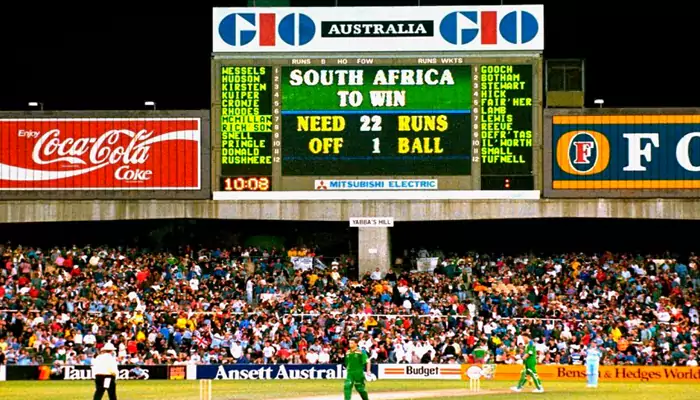
The controversial ending to the match continues to reverberate in cricket history, with many believing that had the rain not intervened, South Africa could have won the tournament.
Rain has often been the foe of cricket, altering outcomes unpredictably. The 1992 World Cup semifinal stands as a stark example, where a promising match was sadly marred by rain. Twenty-four years ago today, in the 2nd semifinal of the Benson & Hedges World Cup on March 22, 1992, England faced South Africa in Sydney. It remains etched in cricket history as one of the most unfortunate and farcical incidents on the field. South Africa, led by captain Kepler Wessels, made their debut in the World Cup with high hopes of clinching the title, buoyed by a talented young squad.
For starters, South Africa crushed the then-defending champions Australia by nine wickets, chasing 171 in their first match. However, they faltered in their next game when they lost against New Zealand, followed by another loss against Sri Lanka. Low on morale, South Africa had to bounce back strongly, and it came through a stupendous spell from Meyrick Pringle. Defending a small total of 201 against the West Indies, Pringle ran past the top order as he dismissed four of the top five batsmen for single digits.
Later, they went on to win both their matches: against Pakistan, they won a rain-affected game where they defended 194 in 36 overs, and against Zimbabwe, they chased down a meagre target of 164. A thrilling win against India in their last league stage match ensured a spot in the semi-finals. South Africa jumped to third place, and their clash was set up against England in the semi-final.

Neil Fairbrother and Phil De Freitas bat England to put up a total of 252 against South Africa at the 1992 World Cup
Wessels won the toss and elected to field first. The overs were reduced to 50 to 45 as the match was set to be played under cloudy and windy conditions. England's innings saw a solid start from openers Graham Gooch and Ian Botham, but Gooch fell early to Allan Donald for just two runs. Botham followed suit shortly after, dismissed by Meyrick Pringle for 21. Alec Stewart and Graeme Hick then steadied the innings with a crucial partnership, with Hick eventually reaching his half-century.
Graeme Hick was awarded Player of the Match for being the standout performer for England, scoring 83 runs off 90 balls. Alec Stewart and Neil Fairbrother also scored 33 and 28, respectively. Despite losing wickets at regular intervals, England managed to post a competitive total of 252/6 in their allotted 45 overs. South Africa's bowling attack was led by Allan Donald and Meyrick Pringle, who picked up two wickets each.

South Africa's Peter Kirsten batting (11) against England during the semi-final chase
In response, South Africa appeared to be on course for victory as Andrew Hudson (46) and Jonty Rhodes (43) kept their team in contention. However, the match took a dramatic turn when rain interrupted play, with South Africa needing 22 runs from 13 balls to win. Following the rain delay, the match officials resorted to the convoluted 'most productive overs' method to calculate a revised target for South Africa.
This method, which took into account the lowest-scoring over of the team batting first, resulted in a bizarre scenario where South Africa needed an improbable 21 runs from just one delivery. Meyrick Pringle's two maiden overs proved costly for South Africa, as the equation was adjusted to 22 runs from seven balls before being further reduced to 21 runs from one ball.
The demands of the host broadcaster, Channel Nine, influenced the decision to continue the match despite the rain delay rather than scheduling it for a reserved day. As the final ball was bowled and Brian McMillan managed only a single, both teams walked off the field disappointed with the outcome. With the game's controversy, England advanced to the final, where Imran Khan's Pakistan defeated them.
Finally, in 2019, England celebrated a historic victory by clinching their maiden ODI World Cup title. However, the cricketing world continues to wait in anticipation for South Africa to achieve their first World Cup triumph.